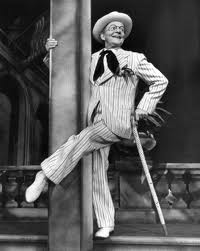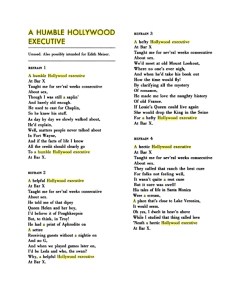Welcome to Musical Theatre Monday and the start of another week on That’s Entertainment! We’re finishing our three week series on some of Porter’s early ’40s work — a period of his that is often overlooked in favor of the more standard-packed ’30s. These three shows all have strong scores, books of middling quality, and unique charms that are distinctly Porter. We’ve already covered Let’s Face It (1941) and Something For The Boys (1943).
1944. Mexican Hayride (01/28/44 – 03/17/45)
This forgotten Porter show, like Something For The Boys, was also produced by Mike Todd and also featured a book by Herbert and Dorothy Fields. The stars this time were Bobby Clark, Wilbur Evans, Corinna Mura, and June Havoc. (Yes, that’s Gypsy’s sister!) Unfortunately, though it was a smash success, Mexican Hayride was deemed trivial and gauche in the post-Oklahoma! climate. Perhaps even more important, the Cole Porter score was, as usual, deemed vastly inferior. We’ll tend to those claims in a minute. First, the plot.
Comedian Bobby Clark plays Joe Bascom, a conman on the lam from the FBI (and his wife) in Mexico. At a bullfight he encounters bullfighter Montana (June Havoc), Clark’s sister-in-law, who sees him in the crowd and angrily throws him the bull’s ear — making him a national hero. Montana agrees to keep his identity a secret so as not to jeopardize her career or her relationship with David (Wilbur Evans). Also among the crowd is Lolita (Corinna Mura), a spicy Latin singer. Meanwhile, Bascom convinces Montana’s agent Lombo (George Givot) to join him in a lottery scheme, which blows up in their faces when the local authorities set their sights on the pair. When Bascom’s wife shows up, he and Lombo don numerous disguises before returning to their respective homes. And Montana’s relationship with David, which was threatened by Lombo’s scheming, remains intact.
The brief summary alone should tell you what type of musical this is — one that shouldn’t be taken too seriously. It seems fitting perhaps that the show was adapted for the screen with Abbott and Costello in 1948 (at the expense of the entire score, naturally). Beyond that — you know the drill — no major productions have been mounted since the original. It has, however, turned up a few times in concert settings, and most recently, as a wonderful production by Musicals Tonight!, which reinstated many numbers written and deleted from the score during the rehearsals and tryouts. Speaking of the score, I mentioned earlier that this is not regarded as one of Porter’s best. Unfortunately, I have to concur — with an addendum: the score as it played in New York is comparatively weak, but if we look at ALL the songs written for the show, we find that they are almost of the same quality as his earlier ’40s work. There ARE some misses, but there are also many hits. Let me share some of them with you.
The original cast (sans Bobby Clark) recorded eight of the show’s songs. Two of the best belong to Mura’s Lolita, the Latin singer whose numbers are best at evoking the flavor of Mexico. Above is “Sing To Me, Guitar,” which features some typical Porter lyrics: “Sing to me of that evening divine/By the moonlit lagoon in the mist/Sing to me of his lips pressed to mine/As we kissed and we kissed and we kissed.” Below is Lolita’s other number, “Carlotta,” in which Mura shines.
June Havoc had a great comedy number in “There Must Be Someone For Me.” Even though I don’t think these are some of Porter’s best lyrics, I like the simplicity of the idea, and can imagine Havoc’s clowning making the number come alive. Here she is from the original recording.
Even though Bobby Clark introduced this number, Wilbur Evans recorded it. Here’s the surprisingly catchy “Girls.”
Other numbers featured on the 1944 recording include: the upbeat and melodic “What A Crazy Way To Spend Sunday” for the ensemble, the glibly grateful “Count Your Blessings” for Havoc, Clark, and Givot, and the bizarre “Abracadabra,” which was given to Havoc and ensemble. (That last one is definitely not my favorite.) One other notable song that was in the show during its New York run (but did not get recorded), is Wilbur Evans’ “The Good-Will Movement.” This is from the Musicals Tonight! production.
Now for some of the deleted songs… The wittiest lyric written for Mexican Hayride would certainly be “A Humble Hollywood Executive.” Here are the words in their entirety from The Complete Lyrics of Cole Porter.
One catchy tune that was “lost in Boston” is “Hereafter,” which was given to Havoc and Clark, and has never been recorded. This is also from the Musicals Tonight! production.
“It’s Just Yours,” which is one of Porter’s sweetest songs — both lyrically and melodically, was also cut. Again, I’m fond of the simplicity. In fact, I think it’s one of the best Porter songs to never make it into an actual show. Here’s Justin Hayford’s appropriately earnest rendition.
Another unused number, again, one of the best Porter songs to never make it into an actual show, is “It Must Be Fun To Be You.” Here’s Joyce Breach with a piano-bar rendition.
Okay, I saved the best for last. The only standard to come from the show, here’s the renowned “I Love You,” naturally introduced by Wilbur Evans. The title came about (allegedly) after Monty Woolley bet Porter that he couldn’t write a hit tune with that simple a title. Guess who was right.
As you can see, as a collective whole, the score is fairly strong. (Of course, I left out some of the weaker efforts, but nothing is truly bad.) It’s not his greatest score, and I wouldn’t ever push this show for a major revival — there are other Porter shows out there that demand more attention. (Jubilee and Out Of This World, for instance.) But let it be known: this is NOT inferior Porter. This is Porter at a time when the American Musical Theatre was changing. It would take him several years to really get with it, but even through these trials and tribulations, he never lost his personal touch. And that’s what Mexican Hayride demonstrates — triumphantly.
Come back next Monday as we launch a series of posts on 1920s musicals! And tune in tomorrow for the best episodes from Season One of Gilligan’s Island!






Pingback: This Week in THAT’S ENTERTAINMENT! History | THAT'S ENTERTAINMENT!